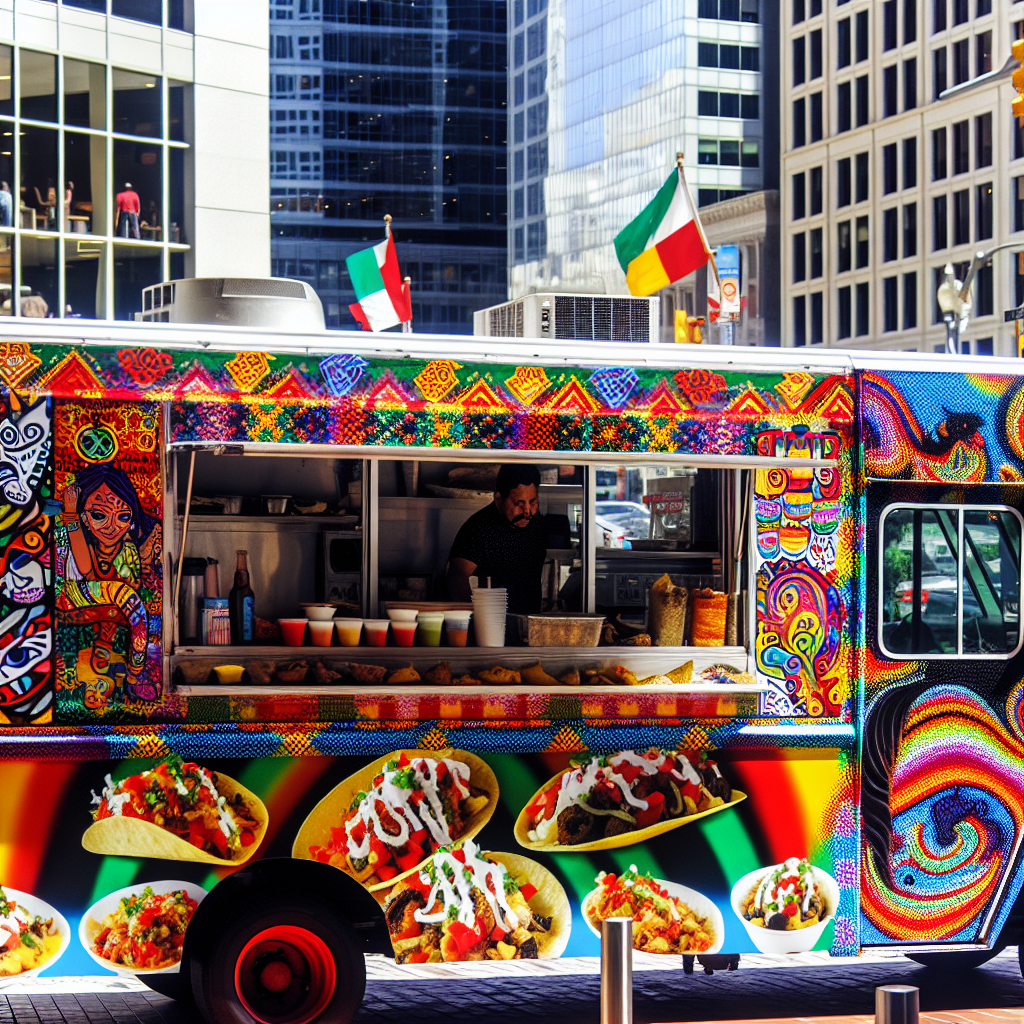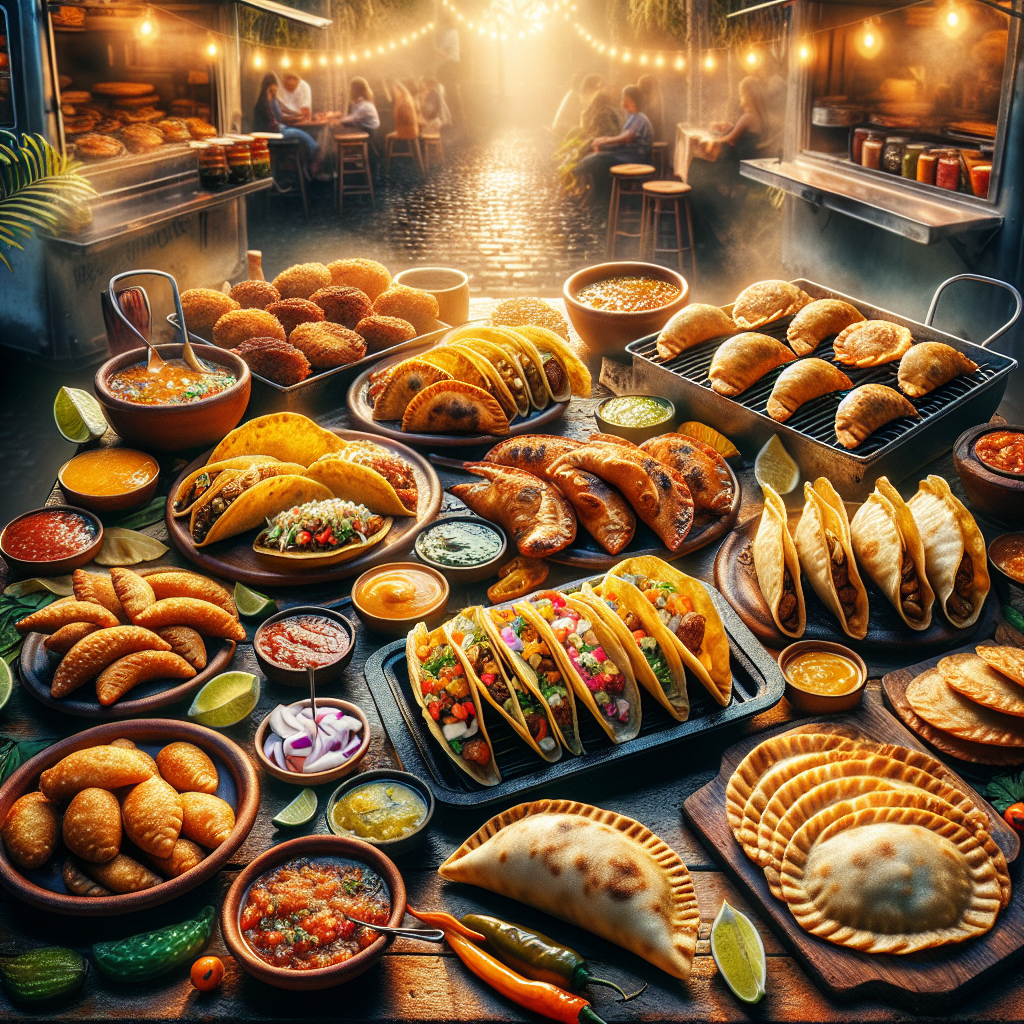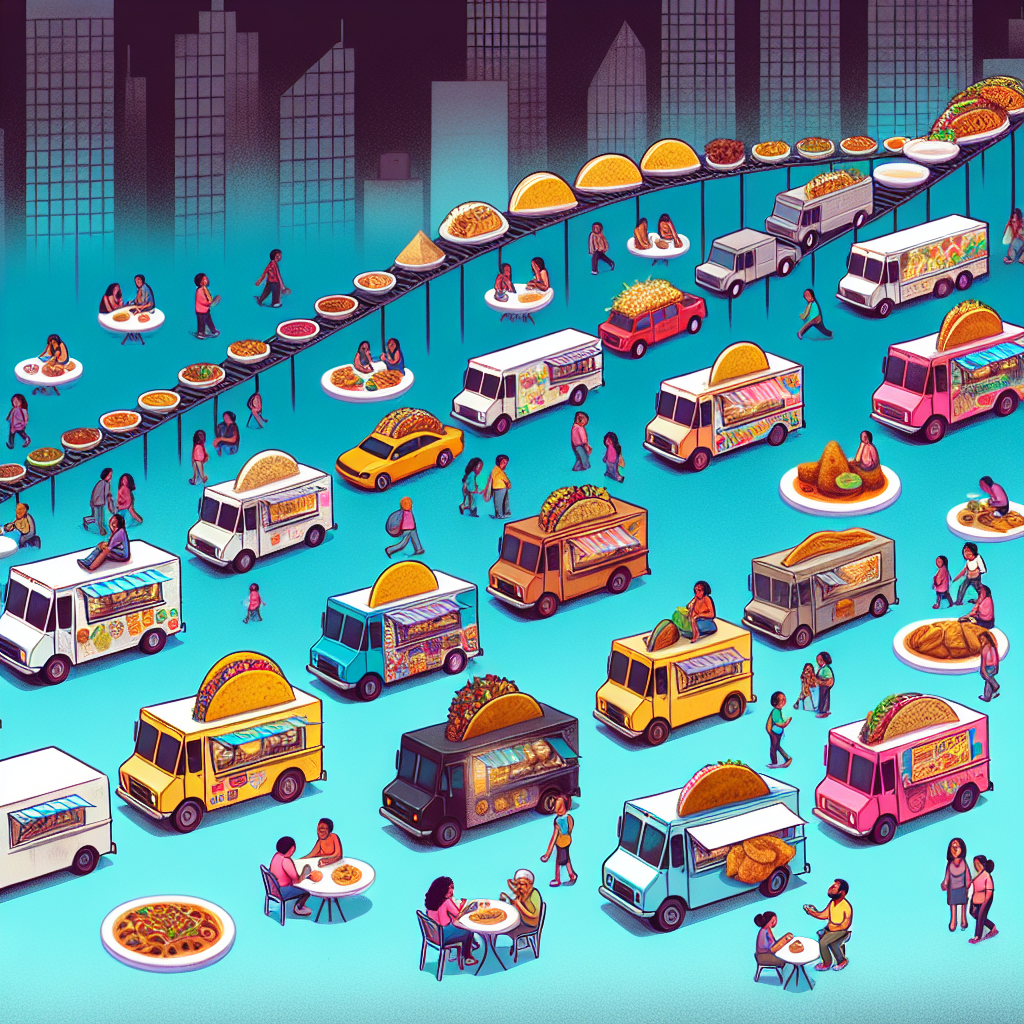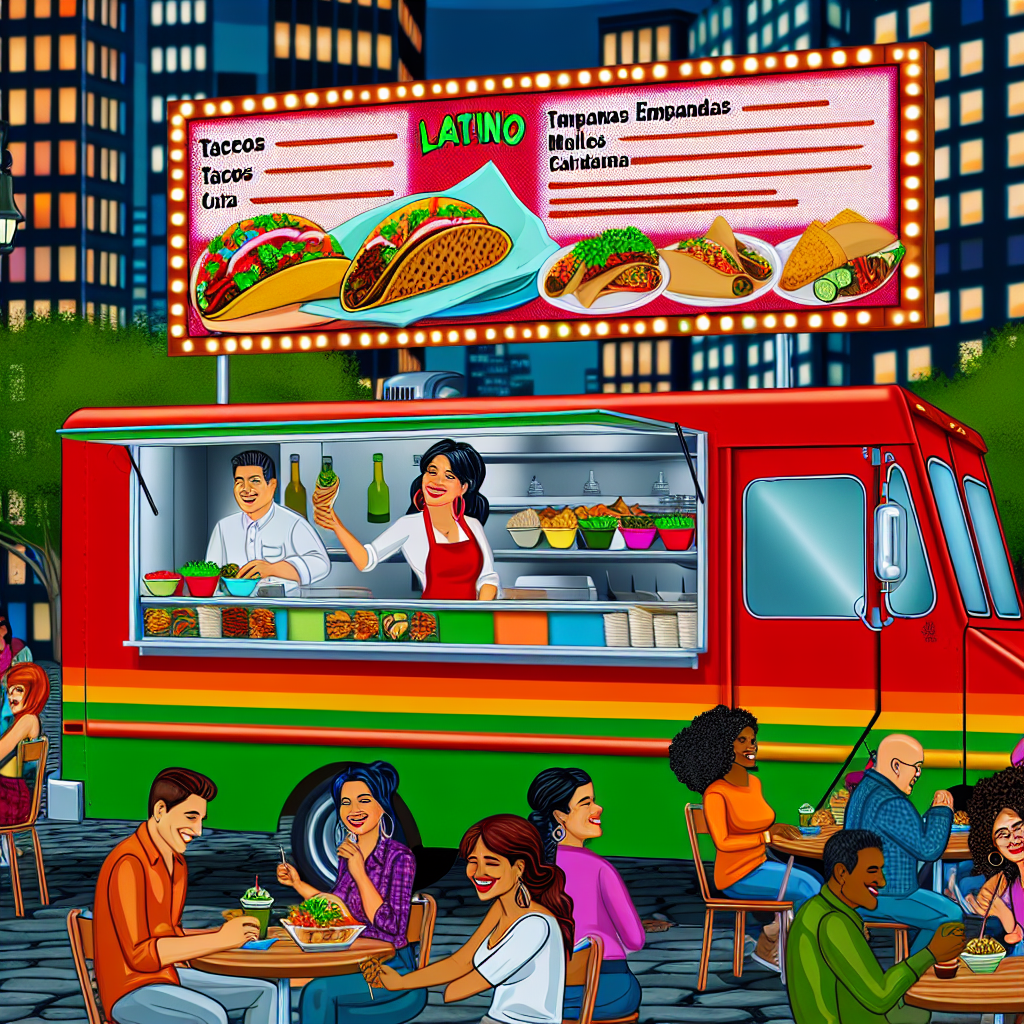In recent years, Latino food trucks have emerged as vibrant beacons of culture and flavor in urban landscapes. These mobile kitchens captivate food enthusiasts with their rich culinary traditions. The appeal of Latino cuisine lies in its diverse flavors and bold spices, offering everything from savory tacos to indulgent empanadas. Each dish tells a story of heritage and passion.
As these food trucks flourish, they do more than just feed the masses; they invite us to explore hidden culinary gems often tucked away in the nooks of the city. Uncovering these lesser-known food trucks allows adventurous eaters to partake in a unique gastronomic experience, showcasing the creativity and authenticity of Latino chefs.
Buckle up and prepare to embark on a flavorful journey that will lead you to the heart of the Latino food truck movement, one delicious stop at a time.
Unique Aspects of Latino Food Culture in Food Trucks
Latino food trucks stand out as unique culinary platforms due to their deep connections to traditional recipes, family influence, and cultural significance. Many Latino food truck vendors often carry family recipes passed down through generations, serving dishes that resonate with personal and cultural history. This familial bond ensures that each meal is not just food but a narrative of heritage, love, and tradition—allowing customers to savor not only flavors but stories as well.
The diversity of Latino cuisine brings a variety of renowned dishes to food trucks, from savory tacos and pupusas to empanadas and arepas, each offering a distinct taste of their origin. For instance, taco trucks often serve homemade tortillas with flavorful fillings, showcasing regional specialties from various countries. Meanwhile, food trucks featuring Latin American street foods bring attention to the regional variations and cultural significance of each dish, creating a mosaic of flavors that reflect the broader Latino community.
Additionally, the vibrant atmosphere of food trucks draws urban crowds, creating communal spaces where people gather to share not just meals but also cultures. The vendors become cultural ambassadors, teaching others about their culinary practices and contributing to a shared cultural narrative. In this way, Latino food trucks do more than just serve meals; they celebrate the richness of Latino food culture and foster a sense of community, making them a vital aspect of the culinary landscape.
Growth and Popularity of Latino Food Trucks
Recent statistics illustrate a booming growth in the food truck sector in the United States, with over 36,000 food trucks operating in 2023—a 10% increase compared to the previous year. This trend highlights the rising demand for mobile dining options across various cities. Notably, Latino cuisine, particularly Mexican food, plays a significant role in this expansion. Data shows that around 8% of all food trucks specialize in Mexican food, and tacos represent approximately 25.18% of all prepared food pairings served by these vendors. This demonstrates the strong appetite for Latino culinary offerings within urban markets.
In cities like Los Angeles, taco trucks, known as “loncheras,” have become iconic representations of Mexican culture. As of 2021, there were over 4,000 taco trucks in operation, primarily owned by Hispanic families, bringing economic opportunities and becoming crucial to the local culinary landscape. Furthermore, the food truck industry has shown substantial growth in employment, with an increase from 59,871 in 2023 to 63,018 in 2024. This underscores the industry’s role in job creation and its contribution to local economies, affirming that the growth of Latino food trucks reflects a broader trend of increasing interest in diverse and culturally rich dining options.
Tips for Finding New Latino Food Truck Locations
Discovering Latino food trucks in urban areas can be an exciting culinary adventure. Here are some effective strategies to help you locate these mobile eateries:
1. Utilize Food Truck Locator Apps
Several apps are designed to help users find food trucks in real-time:
-
StreetFoodFinder: This app provides real-time locations, menus, and reviews of food trucks. It’s available in select cities and allows users to search and filter trucks by cuisine, making it easier to find Latino food trucks.
[streetfoodfinder.com] -
Roaming Hunger: Offering a comprehensive directory of food trucks across the U.S., Roaming Hunger allows users to search for trucks by cuisine and location. Their platform includes real-time maps showing current locations of food trucks, based on schedules vendors enter or data interpreted from vendors’ tweets.
[en.wikipedia.org] -
Foodie – Where’s The Foodtruck: This app enables users to find gourmet food trucks, view their locations using GPS, and receive notifications when a truck is nearby.
[apps.apple.com]
2. Leverage Social Media Platforms
Social media is a powerful tool for tracking food trucks:
- Follow Food Truck Accounts: Many food trucks maintain active profiles on platforms like Instagram, Twitter, and Facebook, where they post their daily locations, special menu items, and upcoming events.
- Use Hashtags and Location Tags: Search for hashtags such as #LatinoFoodTruck, #TacoTruck, or city-specific tags like #NYCFoodTrucks to discover new options.
-
Engage with Online Communities: Join local foodie groups or forums where members share their experiences and recommendations about food trucks.
[myfoodietruck.com]
3. Attend Community Events and Food Truck Festivals
Participating in local events can lead you to a variety of food trucks:
- Food Truck Festivals: These events gather multiple food trucks in one location, offering a chance to sample diverse cuisines. Check local event calendars for upcoming festivals.
-
Cultural Events: Attend Latino cultural festivals, markets, or fairs, which often feature authentic Latino food trucks. For example, the Portland Mercado in Oregon is a collection of food carts focusing on Latin American cuisine and culture.
[en.wikipedia.org]
4. Explore Food Truck Parks and Pods
Some cities have designated areas where food trucks congregate:
- Food Truck Parks: These are permanent locations where multiple food trucks operate, providing a variety of options in one spot.
- Food Truck Pods: Similar to parks, pods are clusters of food trucks that set up in specific areas, often rotating vendors to offer different cuisines.
By combining these methods, you can effectively discover and enjoy Latino food trucks in your urban area.

Popular Latino Food Trucks Comparison Table
| Food Truck Name | City | Specialties | Operating Hours | Social Media Handles |
|---|---|---|---|---|
| Tacos El Gordo | Las Vegas | Authentic Tacos | 10:00 AM – 2:00 AM | |
| La Isla Cocina | Austin | Puerto Rican Mofongo, Ribs | 11:00 AM – 10:00 PM | |
| Empanada Guy | New York | Empanadas, Churros | 12:00 PM – 9:00 PM | |
| Elotes Tijuana | Los Angeles | Corn on the Cob, Nachos | 5:00 PM – 12:00 AM | |
| Arepas 305 | Miami | Arepas, Tequeños | 11:30 AM – 10:00 PM | |
| Peruanito’s Kitchen | Chicago | Peruvian Chicken, Ceviche | 11:00 AM – 8:00 PM |
Conclusion
As we have explored throughout this article, Latino food trucks are more than just mobile kitchens; they are vibrant expressions of culture, tradition, and creativity on wheels. Each dish served offers a taste of heritage, with recipes often passed down through generations, making every meal a flavorful narrative steeped in family history and cultural significance. The booming popularity of these food trucks underscores a growing appreciation for diverse culinary expressions, and it’s vital that we, as consumers, take the time to seek out and support these unique gems.
Whether indulging in authentic tacos from a local taco truck or savoring homemade empanadas, we not only enjoy delicious food but also contribute to the sustainability and growth of the local economy and culture. By frequenting Latino food trucks, we enhance our culinary horizons while fostering community connections. So next time you’re hungry or looking for a flavor adventure, consider stopping by a Latino food truck. Dive into their rich cuisines and support the passionate individuals who bring these culinary treasures to our streets. Let’s continue to celebrate and uplift the diverse tapestry of our food culture, one delicious bite at a time.
Popular Cities for Latino Food Trucks
Latino food trucks thrive across various U.S. cities, fueled by vibrant cultural communities and celebrated culinary events that elevate their visibility. Here are some prominent cities known for their exceptional Latino food truck scenes:
- Los Angeles, California: The city is renowned for its iconic taco trucks, particularly along Whittier Boulevard in East Los Angeles, which is considered a cultural epicenter for authentic Mexican cuisine. The immense diversity within the Latino community provides a rich tapestry of flavors, making it a hub for food trucks serving delicious tacos, tamales, and more.
- Austin, Texas: Known for its innovative culinary scene, Austin boasts several food trucks that fuse Tex-Mex traditions with authentic Mexican dishes. The community hosts various cultural events that showcase Latino cuisine, allowing food trucks to attract new customers with exciting flavors and creative offerings.
- New York City, New York: The bustling streets of NYC are home to numerous Latino food trucks, such as Birria-Landia, which have gained popularity for their authentic dishes. Events like the NY Latin Food Fest provide crucial platforms for these food trucks to reach wider audiences and celebrate Latino culinary heritage.
- Pittsburgh, Pennsylvania: Pittsburgh’s rising Latino food truck scene features popular vendors like Tacos La Catedral, which highlight authentic Mexican and Honduran cuisines. Community events foster connections that celebrate Latino culture, drawing attention to these culinary offerings.
Reasons for Food Truck Success:
- Cultural Heritage: These food trucks serve as cultural ambassadors, allowing Latino communities to share their culinary traditions and flavors, reinforcing their identity within the fabric of American cuisine.
- Economic Opportunities: Food trucks provide a more manageable entry into the food industry for many Latino entrepreneurs, facilitating economic growth while enriching local food options.
Festivals and Cultural Events:
Numerous celebrations impact the visibility of Latino food trucks, such as:
- Fiestas de las Américas and El Grito de Dolores in San Francisco: These festivals celebrate Mexican Independence Day with parades, music, and diverse culinary options, offering food trucks a chance to shine and connect with local audiences.
- Philadelphia’s Dine Latino Restaurant Week: This event promotes Latino-owned establishments, enhancing the exposure for food trucks while creating a sense of community through shared cultural experiences.
These cities exemplify how cultural communities, economic opportunities, and vibrant festivals allow Latino food trucks to flourish, bringing together a rich mixture of heritage, flavor, and shared experiences in urban areas.

A colorful and appealing display of various Latino food truck dishes, showcasing vibrant colors and textures.
User Reviews and Customer Testimonials on Latino Food Trucks
Exploring Latino food trucks reveals a tapestry of personal stories and hidden culinary gems cherished by local communities. Here are some notable experiences that will resonate with readers:
-
Havana Café Food Truck – Fresno, California
Lazaro Santana, the owner, brings an authentic taste of Cuba to Fresno. His food truck was inspired by the longing for his mother’s cooking, and customers often express delight when they taste his offerings, especially the Cuban coffee. One patron shared their surprise at taking their first sip and looking back at the trailer in amazement. This charm has created a loyal following that appreciates the deep emotional connection tied to the food.
-
Red Tacos – Utah
Nancy Garcia’s family started Red Tacos in a small trailer, specializing in Birria de Res estilo Jalisco. Due to overwhelming support, they quickly upgraded to a larger truck. Nancy reflects on their journey with gratitude, noting how blessed they were from day one. Her story of growth reflects the warm welcome and appreciation that an excellent food truck can receive in a community.
-
Pana Food Truck – Santa Cruz, California
Chef German Sierra wanted to share the flavors of Venezuela by emphasizing authenticity in his offerings. His food truck has gained accolades, including placing in Yelp’s Top 100 U.S. Food Trucks. Not only do patrons enjoy the food, but they also appreciate the passion behind each dish crafted with care and cultural heritage.
-
Tacos el Muchacho Alegre – Napa, California
Brought to life by the Pelayo brothers, this food truck has become a staple for fans of authentic Jalisco-style tacos. They’re proud of their roots and the journey they’ve taken from a small start as teenagers to a recognized food truck in the community, sharing their gratitude for the success they have realized together.
-
La Isla Bonita – Venice Beach, California
Antonio Gonzalez and his wife Maria have been serving delicious Mexican seafood from their truck since 1987. Their shrimp ceviche and mango shrimp aguachile have become local favorites. Antonio’s journey from polishing shoes in Mexico to running a successful food truck embodies the heart and determination that many food truck owners have.
These stories highlight the passion and dedication found within Latino food trucks. Each experience offers authentic flavors and personal connections that resonate deeply with their communities, inviting you to explore and taste the treasures that these culinary gems provide.
User Reviews and Customer Testimonials on Latino Food Trucks
Exploring Latino food trucks reveals a tapestry of personal stories that resonate deeply with local communities. Each satisfied customer often has a vivid memory tied to these culinary experiences:
-
Che’s Urban Eats (Sacramento, CA)
Customer Testimonial: “You can taste love in food, you can taste joy in food, and you can taste the emotion in food.”
Highlight: Known for its authentic Argentinian empanadas, with dough imported directly from Argentina, this food truck has created a loyal customer base. [KCRA]
-
Ahuevo Foods (Sacramento, CA)
Customer Feedback: “I’ve had customers tell me, ‘Thank you for that. You take me back to being a kid at my grandma’s house.'”
Highlight: Specializing in Peruvian-Mexican fusion, their lomo saltado burrito—a blend of steak, onions, tomatoes, and soy sauce—has become a fan favorite. [KCRA]
-
La Isla Bonita (Los Angeles, CA)
Customer Experience: “Isaiah, an actor/bartender who works in Venice, tells me as he waits in line that he eats here ‘literally every day.’
Highlight: Known for ceviche tacos and shrimp cocktails, this food truck has remained a community staple for over three decades. [National Geographic]
-
Cultro PVD (Rhode Island)
Customer Observation: “Some people just cut meat, throw some seasoning and call it a day; he actually marinates and buys a quality beef, and it tastes like home.”
Highlight: Emphasizing love and care in their dishes, this Latino food truck sets a high standard for quality, elevating every meal. [Food Truck Operator]
-
Mariscos Jalisco (Los Angeles, CA)
Customer Insight: “His truck gained popularity quickly because the people of the community were finally able to enjoy the tastes that reminded them of their home.”
Highlight: Specializing in authentic Mexican seafood, their unique aguachile salsa sets them apart, drawing customers who crave authentic flavors. [Latin Los Angeles Blog]
These stories highlight the passion and dedication found within Latino food trucks. Each experience not only celebrates authentic flavors but also fosters profound personal connections, inviting enthusiasts to explore and taste the culinary treasures that these food trucks bring to our streets.
Unique Aspects of Latino Food Culture in Food Trucks
Latino food trucks stand out as unique culinary platforms due to their deep connections to traditional recipes, family influence, and cultural significance. Many Latino food truck vendors often carry family recipes passed down through generations, serving dishes that resonate with personal and cultural history. This familial bond ensures that each meal is not just food but a narrative of heritage, love, and tradition—allowing customers to savor not only flavors but stories as well.
The diversity of Latino cuisine brings a variety of renowned dishes to food trucks, particularly Mexican cuisine. With staples such as savory tacos and empanadas, each offering presents a distinct taste of its origin. Taco trucks often serve homemade tortillas filled with rich, flavorful ingredients, showcasing regional specialties from various countries. Meanwhile, food trucks featuring Latin American street foods reflect the cultural significance of each dish, creating a mosaic of flavors that embody the broader Latino community.
Additionally, the vibrant atmosphere of food trucks draws urban crowds, creating communal spaces where people gather to share not just meals but also cultures. The vendors become cultural ambassadors, educating others about their culinary practices and contributing to a shared cultural narrative. This street food culture emphasizes the importance of food truck festivals, where these charming mobile eateries can share their flavors and traditions with larger audiences, further enriching the food landscape.
In this way, Latino food trucks do more than just serve meals; they celebrate the richness of Latino food culture and foster a sense of community, making them a vital aspect of the culinary landscape.
Growth and Popularity of Latino Food Trucks
Recent statistics illustrate a booming growth in the food truck sector in the United States, largely fueled by the burgeoning street food culture. In 2023, there were over 36,000 food trucks, marking a significant increase in mobile dining options across various cities. Notably, Latino cuisine, and specifically Mexican food, plays a crucial role in this expansion, with around 8% of food trucks specializing in Mexican food. Tacos represent approximately 25.18% of all prepared food pairings served by these vendors, demonstrating a strong appetite for Latino culinary offerings.
Cities like Los Angeles are famous for their taco trucks, known as “loncheras,” which have become iconic representations of Mexican culture. With over 4,000 taco trucks in operation, mainly owned by Hispanic families, these businesses not only provide economic opportunities but also contribute significantly to the local culinary landscape. Moreover, food truck festivals provide essential support for these businesses, with food truck vendors experiencing increases of 30-50% in revenue during these events. Participating in such festivals is a common strategy, with 80% of food trucks engaging in them at least three times a year to enhance visibility and customer engagement.
Furthermore, the food truck industry plays a significant role in local economies, growing from 59,871 employees in 2023 to an anticipated 63,018 in 2024. This underscores the industry’s value as a vehicle for job creation and the overall trend of heightened interest in diverse and culturally rich dining options. The rise of food truck culture and festivals highlights not only its economic impact but also its role in celebrating the vibrant narratives woven through Latino food traditions.

This illustration depicts the growth of Latino food trucks over the years, featuring a timeline, various Latino cuisine items, and a bustling urban backdrop.

